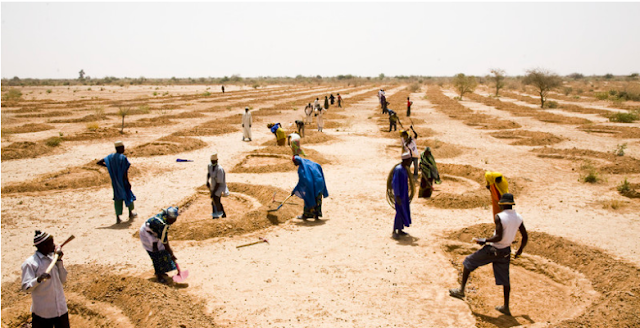Small holder farmers in Tanzania's Usangu Plains
Continuing on from
the inequitable allocation of irrigation permits and access to water in South
Africa, a similar instance of small holder farmers being marginalised by power
governing bodies appears in the Usangu plains in Tanzania.
The Usangu wetlands
lay upstream of the great Ruaha River. The wetland flows through the Ruaha
national park and is a massive economic powerhouse for Tanzania.
The region has
historically been used for rice farming, with the 1970s seeing significant
irrigation expansion led by state sponsored Mbarali
Rice Farm.
The river began to
slowly diminish, primarily beginning with a
loan from the African Development Bank that created a 3000ha private rice
farm named 'Kapunga Rice Irrigation Project' in the Usangu wetland catchment
region. The goal of this was to improve livelihoods of local farmers. However,
with the Usangu catchment being upstream form the national park, it
unfortunately had detrimental impacts on the environment that were poorly
assessed prior to the implementation of the rice farm. The project
completion report states: 'At the time of appraisal, environmental issues
were not taken into consideration,' However, later understanding
'retrospectively' that it was necessary to do so. The most important impacts,
effecting the entire Great Ruaha were as followed:
- Significant loss of wildlife habitats: forcing wildlife to retreat towards the north and east.
- Major hydrology disturbances: due to significant water flow of the Great Ruaha and Chimala rivers being diverted for irrigation purposes, the river beds are dry during the dry season.
- Heavy use of insecticides: used to protect the rice from pests, creating a burden on the immediate environment and groundwater further downstream affecting aquatic life.
Current access to water:
Previously, the
upstream wetlands would supply the Great Ruaha with water accumulated from the
rainy months. Irrigation today is still a significant feature in the Usangu,
with the catchment now divided into 3 sections.
In the post-colonial
period, state institutions became the most important actors, affirming their
dominance by structurally controlling local institution. By controlling the
arrangements for access to water, the outcomes for people and ecosystems were
also determined.
Franks
et.al describes the locus of power as 'poly-centric', due to a network of
powerful individuals, often wealthy farmers with very large holdings dominating
decisions. Legal arrangements are made to shape the access to water, by
creating a single fee for the right to wet season water abstraction, as well as
a judicial system to control the resolution of conflicts between citizens over
water right. This is were inequitable outcomes may be observed, as often
marginalised groups often are unsuccessful in the legal processes, due to a
lack of resources. The power dynamics, are asserted by actors that 'reshape
the government arrangements for their
benefits and to the exclusion of others'.
The case of the
Usangu plains is interesting, as often it the
case that smallholder farmers are being marginalised by big institutions
or organisations withholding power. This is partly the case, but most of the
power is held by local, wealthy farmers. The voices of the influential figures
are often more valued than smallholder famers, and can have negative outcomes
for the ecosystems as a whole, but particularly in the downstream areas that
host the poorest farmers. An example of this is when influential farmers opt
for dry season irrigation, straining the already depleted resources. The most
powerful farmers are found to be those with the largest holdings as well as
being in close proximity to the offtake (an agreement between a producer of a
resource and a buyer of a resource). Financial wealth, allied with considerable
family networks allows some farmers preference in access to water in early
stages of development. This echoes elements of the 'Harmon Doctorine', where
watercourse diversion and abstraction, be it for irrigation in the case of the
Usangu, is in self interest allowing an upstream riparian to freely utilize the
water, without assessing consequence for downstream habitants.
The complexity of
water allocation rights and management is enhanced by pluralistic nature of
power as well as the ever decreasing water resources. To move forward, it is
essential that the less powerful voices are heard to ensure the security of the
farmers as well as the ecosystem.
For further information on the topic, an interesting
podcast by Frances Cleaver, where she discusses the resource management in the
Usangu Plains:



Comments
Post a Comment